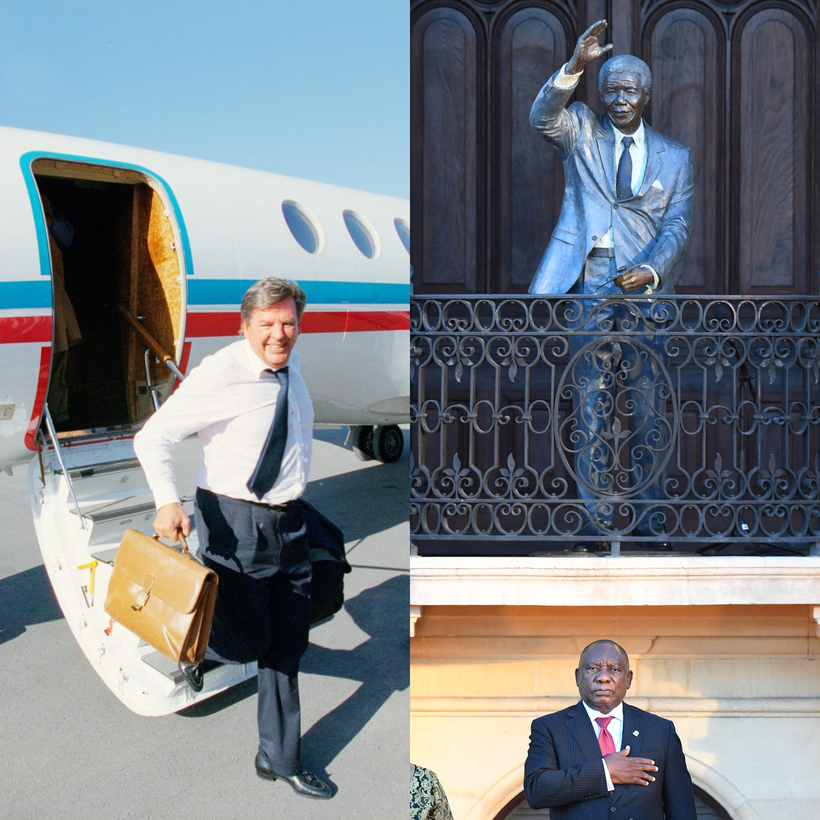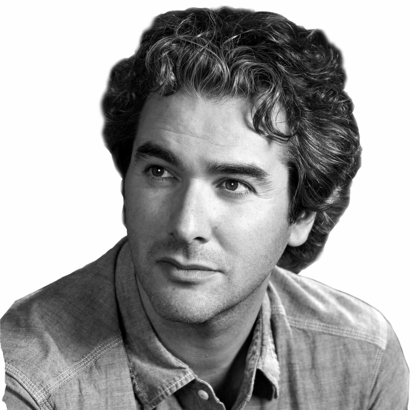One of the most surprising moments in Donald Trump’s recent televised Oval Office ambush of Cyril Ramaphosa came just after Trump accused the president of South Africa of overseeing a genocide against white farmers.
“Death, death, death, horrible death,” Trump declaimed, like some dinner-theater Shakespearean villain, after showing the stunned South African delegation a video of hundreds of white crosses, which he claimed marked a mass-burial site. (It was actually a temporary memorial to two South African farmers who had been killed.)
Yet despite the flood of factual inaccuracies and exaggerations, Ramaphosa and his delegation could not seem to convince Trump that their white countrymen were not the victims of ethnic cleansing. Then a stocky white man with a full head of graying hair and a thick Afrikaans accent, who had been standing just off-camera, stepped forward to challenge Trump’s narrative.

“We have too many deaths, but it’s across the board. It’s not only white farmers,” he said, wearily, as if it were the clearest thing in the world. With a mixture of straight talk and deference, he went on to state that although crime in South Africa was bad, it was not beyond fixing. “Remember, sir,” he said to Trump, “you and I lived in New York in the 70s. We never thought New York could be what it became.”
He called on Elon Musk (reportedly one of the main propagators of the white-genocide conspiracy theory) to invest in the country, and he expertly flattered the usually combative J. D. Vance by saying South Africa could learn a lot from the vice president’s book, Hillbilly Elegy, on how economic failure can destroy communities.

The effect was astonishing, not only because it both contradicted and quieted Trump—usually the two are mutually exclusive—but because the speaker was Johann Rupert, the enigmatic 75-year-old C.E.O. of the luxury-goods conglomerate Richemont (whose brands include Cartier, Montblanc, Van Cleef & Arpels, and Alfred Dunhill) and the richest man in all of Africa.
Little known outside his home country, Rupert has been called “the Warren Buffett of South Africa.” But while his business instincts share a similar prudence with the Sage of Omaha, he has none of Buffett’s cult of personality. Nor has he the glamorous public profile of his fellow luxury-goods magnate Bernard Arnault.
What Rupert does have is an enviable network of political and business influence that stretches across the globe, from Jack Ma, in China, to Mohamed bin Zayed Al Nahyan, in Abu Dhabi, to the former U.S. Treasury secretary Steve Mnuchin, in the United States.

And it’s on the world’s most exclusive golf courses that Rupert—an avid linksman—can often be found brokering deals. When he’s not playing at his own Leopard Creek Country Club, where elephants from the nearby Kruger National Park often traipse beside the fairways, he can be found at the extremely private Seminole Golf Club, in Juno Beach, Florida, where members have included the Duke of Windsor, John F. Kennedy, and Tom Brady (but not Donald Trump, who was reportedly blackballed from joining when his then wife, Marla Maples, breast-fed their infant daughter in the club’s restaurant).
Rupert’s authority is unofficial but immense. He is the rare man whose admirers included both Henry Kissinger—who praised him for “always standing up for what is right”—and Nelson Mandela, who referred to him as his “son.”
A Proud Afrikaner
Johann Rupert’s actual father, Anton, was a chemist who, after starting a cigarette company in South Africa in the 1940s, created the giant industrial conglomerate Rembrandt. Proud Afrikaners, the Ruperts trace their origins back to the arrival of the Dutch at the Cape of Good Hope in 1652. So proud are they that, in 2005, when Wallpaper described Afrikaans as “one of the ugliest languages in the world,” the Ruperts immediately withdrew all their company’s advertisements from the magazine.
Yet Anton was not afraid to stand against the Afrikaner-led, white-supremacist National Party, which instigated apartheid in the country in 1948. He pursued a system of what was termed “loyal resistance”—railing against “the stinking corpse of apartheid” at home, while defending his country overseas. In 1966, he coined the phrase that declared the fortunes of whites and Blacks were forever interwoven—“If they don’t eat, we don’t sleep”—and engaged in numerous philanthropic efforts throughout his life to help aid Black South Africans.

Johann Rupert followed in his father’s enlightened footsteps. He was ejected from naval-officer training after it was revealed he had produced an anti-apartheid edition of the student newspaper while at Stellenbosch University. It was there he also struck up a friendship with the anti-apartheid activist Steve Biko, before Biko was murdered by South Africa’s security forces.
Rupert moved to New York in 1974 to work at Chase Manhattan, then worked at Lazard Frères & Co., and when he returned to South Africa five years later, he took up the reins of the family business, spinning off Rembrandt’s luxury-goods investments into Richemont, the Swiss-based holding company for the family’s many maisons specializing in jewelry, watches, and fashion. (For years it’s been rumored that either L.V.M.H. or Kering would buy Richemont, but Rupert has shown no interest in selling.)
After the fall of apartheid, in 1990, Rupert and his father attended the Truth and Reconciliation Commission, unlike many other South African businessmen. They acknowledged how they had prospered under apartheid, but also showed how they had fought against it. Their enthusiasm for a newly democratic South Africa led Nelson Mandela to ask Rupert to take part in negotiations on the new South African constitution.
It was at this time that Rupert first met Ramaphosa, then the African National Congress’s chief negotiator. The A.N.C. had strong Communist leanings, and many were advocating the nationalization of South African industry. When Ramaphosa asked Rupert why Richemont was based in Switzerland, Rupert answered, “Cyril, it’s actually very simple…. I have to protect the assets of my stakeholders—the shareholders—against your stakeholders.” Ramaphosa “nearly split his sides” at Rupert’s frankness, and the pair became friendly.
An “Afro-Optimist”
Since the rise of Black rule in South Africa, Johann Rupert has not changed his tune. He espouses a universal basic income, believes in climate change, and considers himself an “afro-optimist.” But while the Ruperts’ strident stand against apartheid separated them from the white rulers of the country, accusations that Johann Rupert’s fortunes were built off the back of cheap Black labor have persisted.

Indeed, under the corrupt government of Jacob Zuma in the 2010s, Rupert was attacked as being the don of the “Stellenbosch mafia,” a collection of white billionaires operating out of the picturesque town of Stellenbosch, in the wine country just east of Cape Town, what journalist Pieter du Toit has called a “cross between Silicon Valley and the Hamptons.”
Rupert detests the term, especially as he no longer lives in Stellenbosch. But Zuma painted him as the face of “white monopoly capital,” a conspiracy theory in which white people were actively seeking to impede economic empowerment for the Black population. With apartheid an ever lingering memory—and with the World Bank declaring the country the most unequal on the planet—it was a powerful accusation.
“He is a very prickly character. He can be very gruff. He’s very blunt. And that is often interpreted as racist, but I don’t believe he is,” says du Toit, who spent two years in close contact with Rupert while researching his book The Stellenbosch Mafia. “He does agree that a form of upliftment of excluded Black South Africans must happen.”
It turns out the “mafia” smear was largely the work of a British P.R. firm, Bell Pottinger, hired by Zuma’s main financial benefactors, the Guptas—a wealthy Indian business family—as part of a bid to distract the country from the wholesale pillaging of government agencies by the Guptas themselves.
“He was cast as the enemy of the Black majority in the country, and he took that very personally,” du Toit says. He fought off the accusations—adding to his sense of betrayal, Bell Pottinger represented Richemont too—and called for Zuma to resign.

By 2018, Bell Pottinger had gone bankrupt, the Guptas had fled, and Zuma was no longer president. But the false accusations still stung. When Rupert’s old friend Ramaphosa became president, he did not call on the billionaire for his advice. After being involved in South African politics for so long, Rupert was left out in the cold.
That was until Trump first made accusations of white genocide, in February of this year. “[South Africans] were quite incredulous when we heard those announcements,” says du Toit. “There was certainly a recognition by the [South African] presidency that perhaps the time had come to utilize Rupert’s contacts in Washington, D.C.” Rupert allegedly facilitated the first phone call between Ramaphosa and Trump.
So the meeting in the Oval Office was not just a repudiation of Trump’s misinformation; it was also a vindication of Rupert’s own role in South Africa. He had always wanted to be recognized as someone who was completely and utterly supportive of the post-1994 democracy. “That was a moment in which he declared to Ramaphosa and the rest of the country that, look, he is a patriotic South African,” says du Toit. “He might not agree with government policy, but he will also stand up to disinformation being disseminated by anyone, including Donald Trump.”
George Pendle is an Editor at Large at AIR MAIL. His book Strange Angel: The Otherworldly Life of Rocket Scientist John Whiteside Parsons became a television series for CBS All Access. He is also the author of Death: A Life and Happy Failure, among other books


